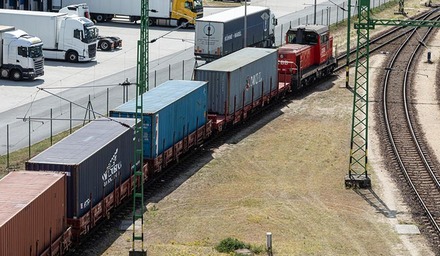
The first train consisting of 20 wagons brought machines, vehicle parts, electronic devices and items of clothing from Asia to Budapest, and it transported goods of the food and plastics industry, as well as machine parts on its way back to the Adriatic port.
In addition to Piraeus, Rijeka and Koper, the market-leading Hungarian rail freight company has also connected Trieste to its continuously developing container train network. The number of trains from the northern Italian port is planned to triple from mid-December.
In less than a month, the volume of transported goods from other Adriatic ports also increased significantly. The Rail Cargo Terminal - BILK is connected to the ports of Koper and Rijeka by an additional two pairs of import trains every week, and the traffic increase between the Greek Piraeus and the container terminal is similar as well. Currently, about 30 pairs of trains per week transport goods to the southern docks.
Continental freight traffic by rail between Hungary and China is also increasing. In October, in addition to Xi'an and Jinan, a scheduled rail connection with another Chinese industrial centre, Shenzhen, was established. This train arrives to the Hungarian border, Záhony (Eperjeske) via Kazakhstan, Russia and the Ukraine. The number of container trains arriving from China to the European Union via the Polish station Małaszewicze has also increased slightly. This year approximately 50 container trains arrived from this direction. The trains transport products mainly to the Hungarian market, but from the RCT - BILK many containers continue their journey on rail to Italy, Romania, Turkey and Germany.
Rail Cargo Hungaria has been experiencing a growing trend of Far Eastern rail intermodal traffic since August. After the negative effects of the coronavirus, the Chinese production and transport started moving again, which resulted in the period between April and August in a 13% increase compared to the base volume of RCH's Asian intermodal traffic, which also led to a reorganization of the Adriatic ports.
The number of container trains handled by Rail Cargo Hungaria was significantly higher than in the same period of the previous year.
